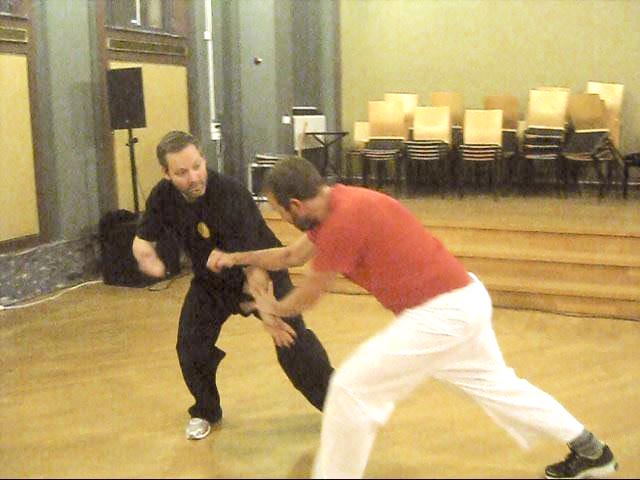IF THERE IS FORM, STRIKE THE FORM

If there is Form, Strike the Form
Question
Sifu, I was looking through the Shaolin Wahnam videos and found the Choy Li Futt video called "If there is Form, Strike the Form. If there is No Form, Chase the Shadow."
This reminded me when I was sparring with a lower-level opponent. I knew I could just over-power him easily if I was brutal but I didn't want to do that. I was mostly frustrated at my own technique and that I couldn't tie him up easily. In the end out of frustration at myself and my lack of tactics to deal with his broken rhythm and lack of form, I just roundhouse kicked him repeatedly.
Later, even though Tim is of a much higher level than me and beat me easily, I at least found it easier to exchange with him and I described to Sifu previously what a joyous and spiritually free experience it was sparring with Tim.
— John, Ireland
Answer
"If there is form, strike the form; if there is no form, chase the shadow" is a very effective tactic irrespective of at what level the opponent is.
"Form" here means any form, i.e. his movement of hands, legs and body, not just kungfu form. If there is form, strike the form. If an untrained opponent moves forward, strike his body with your "iron" arm. If a Karate opponent attacks you with a punch, move back to avoid his punch and simultaneously strike his arm. If a Taekwondo exponent kicks you, move back to avoid his kick and simultaneously strike his leg. Do not strike him just once but continuously.
"Chase the shadow" means that when an opponent withdraws his punch or kick and moves back, cover him adequately and strike his head or body with your "iron" arm. Do not strike him just once but continuously.
As in all tactics and techniques, you need to practice them. Once you know a selection of these tactics and techniques, use them effectively. If an opponent is untrained or of a lower level, it is easier to defeat him, like using round-house kicks. You may not have to use tactics.
But if the opponent is trained and of the same level or of a higher level, you may have to use tactics, such as "continuous attacks", "instance response", "sound east strike west" or "lead opponent to futility then respond with surprised attacks".
But ultimately it is skills that decide the winner. If your opponent is more skillful than you, even when you use good techniques and he doesn't know the tactics, he can defeat you. But if you use tactics, you can defeat him even when he is more skillful.
Today, many combatants do not even know techniques. They just exchange blows generously.
LINKS
